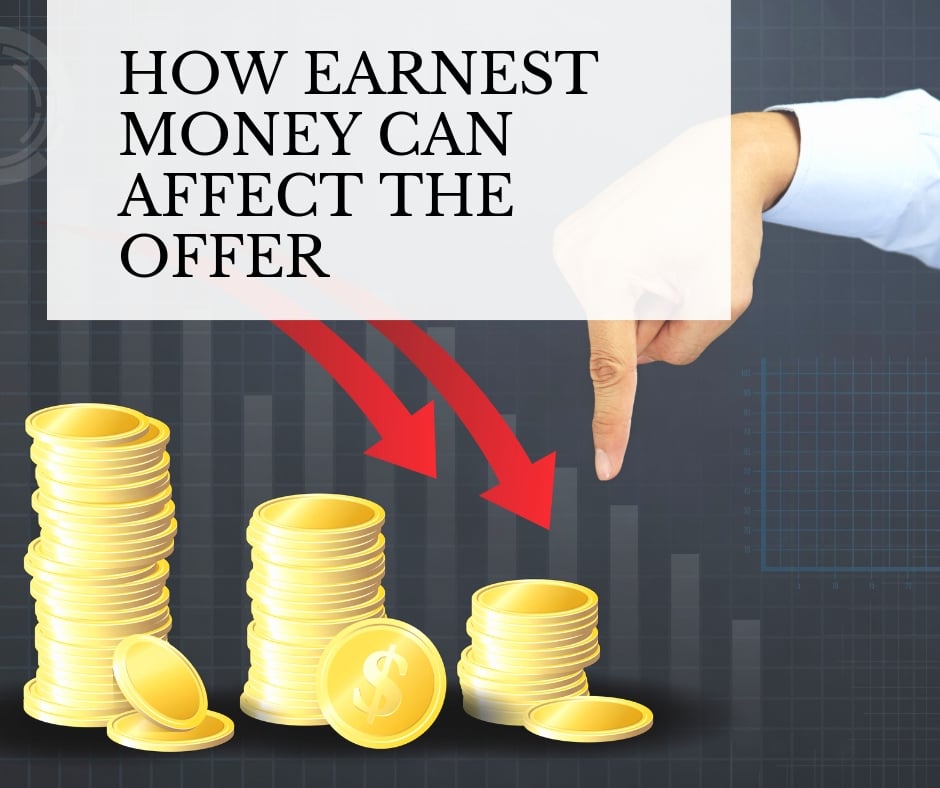Earnest money is a good faith deposit when you place an offer on a piece of property in order to convince the seller that you're serious enough about your offer to put money down on it. The earnest money deposit is usually in the form of a check but can be in the form of a cashiers check or money order. The amount is typically based on the asking price of the home although not always. It is usually 1% to 3% of the asking price of the home but can be of little as $500. Technically, the earnest money is not required to make an offer but there are very few if any offers accepted without some sort of earnest money deposit. The higher the earnest money, the more the buyer has to lose and therefore conveys to the seller that they are extremely serious about reserving the property for themselves.

In the case of multiple offers, a seller may defer to the amount of the earnest money deposit when deciding on which offer to choose. For instance: if two very similar offers came in, similar financing contingencies with similar offering price but one offer had a $500 deposit and the other hundred $10,000 deposit, the seller assumes that the buyer with a $10,000 deposit is more likely to follow through. While this is not always the case as many buyers cannot afford a $10,000 earnest money deposit, the seller knows that if the buyer defaults without just cause, the seller could end up keeping that $10,000 earnest money deposit.
Related: How to Save Thousands on Your Next Home Purchase
The only way a seller keeps the earnest money deposit is if the buyer simply walks away without just cause. As a buyers agent, we specialize in being able to work for our buyers whether it means getting the earnest money deposit back or negotiating for their terms. A case where the seller would end up with the earnest money would usually be due to the fact that there is no reason the buyer is backing out. If the financing goes through, the inspection contingency is satisfied and at the very last moment before closing the buyer decides to walk away, the seller can usually keep the earnest money deposit as retribution for all the hassle they went through up to this point. The seller would need to relist the property and now has wasted the time on the market that the buyer has taken up during the purchase and sale proceedings.
Related Post: Can You Buy a FSBO (For Sale By Owner) Even if You Have an Agent?
Earnest money deposit there only deposited with the escrow company or the real estate agency once mutual acceptance of the offer has happened. The buyer's agent will typically hold on to the check until the seller agrees to the offer. Once this happens, the transaction moves on to "subject to inspection". If the inspection does not go through properly or the buyer wants to back out for any reason, the inspection is a good way to do so. The buyer will typically get the earnest money back and the transaction will be terminated. If the inspection does go through it moves on to "pending". From here, all roads lead to the final closing. If some contingency or addendum does not go through such as financing, the sale of another house or any other contingency, the buyer can usually get the earnest money back. If everything goes through and buyer and seller come down to the final signing and then the buyer wants to back out without any major reason, they could be at risk for losing the earnest money.
If the seller backs out at the last minute without reputable cause, the buyer will receive the earnest money back as well. There are very rare instances when the sellers gets to keep the earnest money but it does happen.
Read More: What Happens if One Party Breaks the Real Estate Contract?
This is why using a dedicated and experienced buyers agent is so crucial. A great buyers agent will help the buyer through all of these contingencies and addendum's offering tips, suggestions and advice to the entire proceeding.